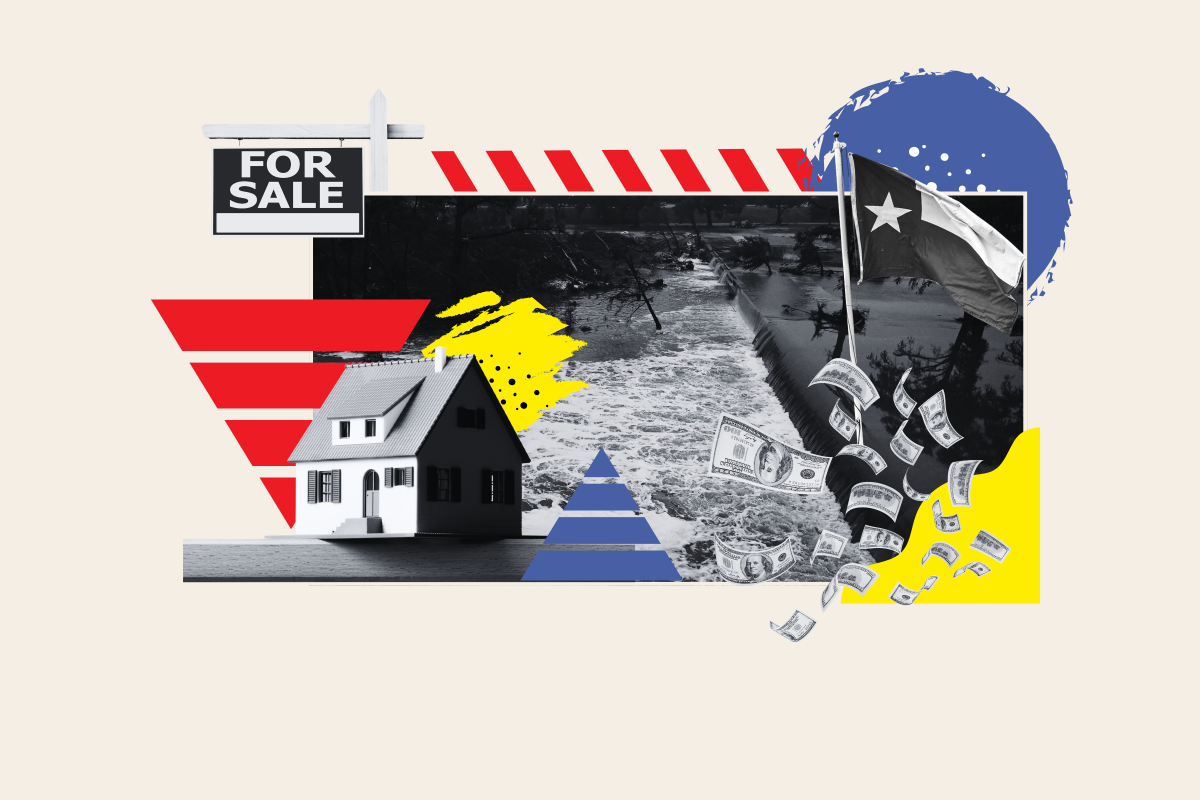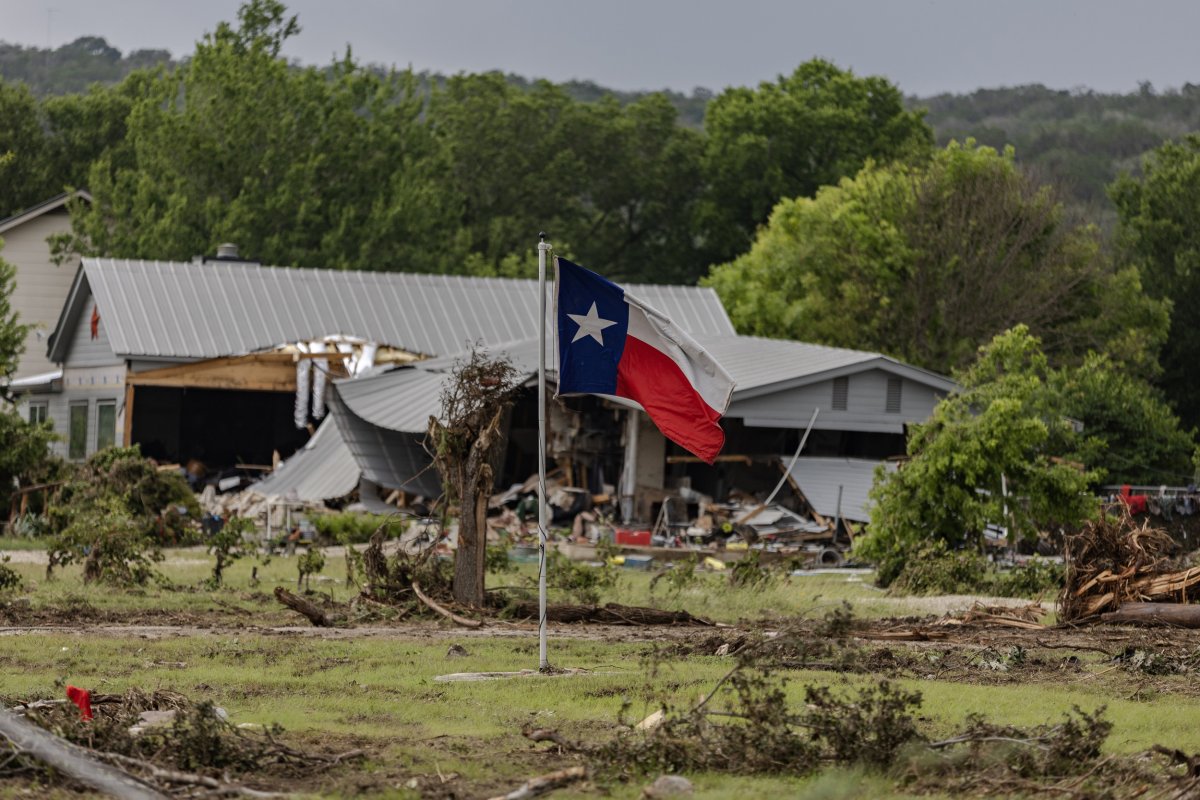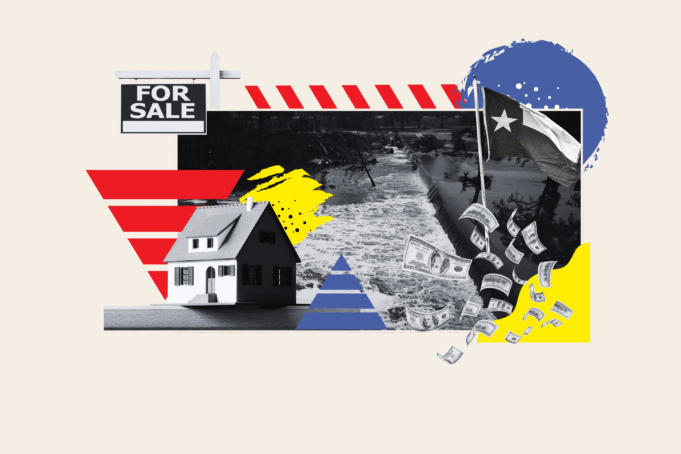The flash floods that claimed the lives of at least 135 people in Texas Hill Country on July 4 also impacted thousands of properties that stood along their path of death and destruction, according to estimates by researchers at data-driven tech company Cotality.
Using rainfall, stream gage, and property data, Cotality experts recreated the footprint of the flash floods in central Texas, finding that over 38,600 homes in nine counties deemed eligible for individual and public assistance by the Federal Emergency Management Agency (FEMA) are likely to have been damaged during that tragic weekend.
“Now, that is a model number, but we stand by it and feel very confident in this number. And that’s everywhere from Kerr County to Travis County, in and around the Austin area,” Jon Schneyer, Cotality director of research & content, told Newsweek.
While not all of these homes are likely to have been damaged by the floods, all of them were at least impacted, with properties in Tom Green, Travis, Kerr, Williamson, and Burnet counties identified as the most at-risk.
For homeowners impacted by the floods and for anyone living in this particular part of central Texas already grappling with the immense loss of life caused by the extreme weather event, the coming months are likely to bring new challenges, experts say, and additional financial burdens.
RONALDO SCHEMIDT/AFP via Getty Images
What the Floods Could Do to Home Insurance Premiums
The cost of home insurance has skyrocketed in recent years in Texas, reaching an average annual cost of $4,585 this year—117 percent more than the national average of $2,110, according to NerdWallet.
Premiums are so expensive that many homeowners cannot afford them, and some are choosing to renounce paying extra for flood coverage, which is not included under the standard homeowner policy.
“Remember, flood insurance is not offered as a standard homeowners insurance policy. You usually go and get your flood insurance through the National Flood Insurance Program through FEMA,” Schneyer said. “Now, that is not required unless you have a mortgage and you’re in the special flood hazard area or the 100-year flood zone.”
He added: “A lot of those homeowners, especially as you get outside of Kerrville or outside of Austin, might have already paid off their home, they are no longer required to have flood insurance.”
Cotality expects only a few homeowners to have flood insurance in this part of Texas.
“They’ll be able to apply for assistance through FEMA, but a majority of that damage, if they don’t have flood insurance, it’s going to be on the home and business owners to foot that bill,” Schneyer said. “If your home cost $500,000 to rebuild entirely, that could be a pretty expensive recovery, not to mention the emotional and psychological damage from friends and neighbors losing their homes and livelihoods.”
Home insurance premiums could further rise as a result of the recent floods, exacerbating homeowners’ existing struggles to protect their homes and even purchase properties.
Bill Baldwin, board member of the Houston Association of Realtors (HAR) and a broker with 90 agents under his direction, told Newsweek that the biggest challenge he faces in the industry today is insurance.
“It’s the unaffordability of insurance, the inability to get insurance,” he said.
Baldwin and his colleagues at HAR have spent “a ton of effort, money and cooperation on providing flood notices” in recent years, but despite all of this, he said, they have not observed any increase of people securing flood insurance in Houston.
“We have fewer people today with flood insurance than had at the day Harvey hit,” Baldwin added. “The year after Harvey hit, we saw an increase in flood insurance policies. The cost of the flood insurance policy went up. Now it’s been five years, six years, seven years, and the homeowners today are different from the ones back then—half of the people weren’t here when Harvey hit.”
It is a “constant battle” to convince local homeowners that they need insurance, Baldwin says, even if they live in flood-prone areas. “We’re Texans, we are hard-headed, we have a mindset of our own,” he said.
“We think we’re supermen when we’re not, necessarily. And we often don’t experience or expect the intensity of the extreme weather events that we’re now seeing,” Baldwin explained. “We feel like we’re not as vulnerable as we perhaps are.”

Newsweek Illustration/Canva/Getty/AP Newsroom
…To Home Prices
All of these upward pressures on the cost of homeownership will reduce the desirability of living in flood-prone areas, putting downward pressure on housing demand, Cameron LaPoint, real estate expert and assistant professor of finance at the Yale School of Management, told Newsweek.
“We are already seeing similar out-migration trends in places like coastal Florida, where there are similar problems of severe natural disaster risk, unraveling insurance markets, and evidence of post-pandemic overbuilding,” he said. “A lack of affordable insurance may push prospective homeowners to look elsewhere, such as in climate haven cities in the northern U.S. which are among the few housing markets growing right now.”
LaPoint believes the areas directly impacted by the flash flood are likely to face “a continued decline in house prices and rents, which was already in progress after the recovery from the pandemic.”
Other experts, however, are skeptical about the idea of people choosing to live elsewhere because of the floods.
“It might temporarily influence some homebuyer decisions, but the appeal of those counties will not likely change,” Dr. Daniel Oney, research director at the Texas Real Estate Research Center at Texas A&M University, told Newsweek. “There may be some outside investor interest, but with mortgage rates currently high, investor activity is down overall—they rely on cheap credit to make their business models work.”
Baldwin is sure that Texas Hill Country will remain a popular vacation spot despite the risk of flash floods.
“If you’re from here, you’ve grown up going to the Guadalupe, or the Frio, or the Trinity. And it’s a time-honored tradition to go to these places,” he said. “Despite the tragedy, people will keep vacationing there, as we’ve seen people build after a hurricane or after other disasters. Houston is very hurricane-prone, but we added 75,000 people last year to the greater Houston area. They’re not deciding against moving here because of the hurricane. They’re learning to live with the new intensity of weather-related events.”

Jim Vondruska/Getty Images
…To Rent Prices
According to Oney, rent prices are likely to jump up in the short term in the areas affected by the floods. In the long term, it would be the “overall demand for those properties that will play a role,” he told Newsweek.
“Those communities have been popular for retirees and vacation homes because of the natural amenities,” Oney said. “People’s perceptions of risk are curious. In a few years we would expect the market dynamics to return to something like they were. Though rebuilding may try to avoid high flood risk areas.”
Baldwin fears the short-term impact that the communities along the Guadalupe River could suffer as tourism dries up and relocate to different parts of the state this summer, rather than any long-term impact.
“Many of the people who are still on vacation around the greater Houston, Dallas, Austin area are gonna go to Fredericksburg or Round Top or Wimberley or one of these places that aren’t necessarily related to the river, but they’re still in the Hill Country and they have the same climate,” he said.
The greatest impact of this temporary exodus of tourists will be felt by working-class people, Baldwin added. “It’s the maid who can’t work in that deal, it’s the lawn guy who doesn’t have a job, it’s the waitress who doesn’t have anyone to wait on because the restaurant was closed for two weeks and did not have any unemployment insurance.”
These people, Baldwin said, need Texans’ help—and he thinks locals will be rushing back to support them. “Because that’s what Texans do,” he said.
…And to Property Taxes
LaPoint expects property tax revenues for the region affected by the flash floods to potentially shrink in the coming months, as homeowners impacted would either not be able to afford it or benefit from exemptions passed by appraisers as a form of relief.
For example, Travis County, in Austin, is offering exemptions if the property suffered damages of at least 15 percent of its value, with up to a 100 percent exemption for those who suffered a total loss of their property.
“More appraisers in flood-impacted counties are following suit,” LaPoint said.
At the same time, property tax bills could fall as a result of lower property values—at least in the short-term.
“There is research showing that house prices fall in neighborhoods recently experiencing severe flooding, whether due to flash flooding or hurricanes. If price declines persist, this would also reduce future property tax revenues,” LaPoint said.
He added: “However, changes in house prices may not always translate to immediate changes in property tax bills due to the stickiness of assessed values and limits on rates. Recent amendments to property tax law in Texas increased homestead exemptions and made it more difficult for cities to raise rates. This will make it difficult for cities to close any short-run revenue gaps without aid from the state government.”
In its research, Cotality has found that areas that are frequently impacted by natural disasters experience a longer-term reduction in property values, while areas that are only occasionally hit experience a short-term drop.
“What we have noticed is that over time, things start to regress back to normal. So especially in areas that are not impacted on a monthly or annual basis, if it’s a decade in between flooding events, there’s a bit of a short-term memory mentality.”

Brandon Bell/Getty Images
What Changes We Can Expect the State Government to Make
A majority of the experts who spoke to Newsweek expect the floods will not spur a seismic change in the state’s real estate sector.
“Texas is a strong property rights state. The governor (Greg Abbott) has called a special session with a few flood-related items, but they are limited to immediate relief efforts, flood warning systems, and streamlining regulations to help recovery,” Oney said. “Additional property tax relief was on the session agenda before the floods. So, we don’t expect the state to take any action that impacts markets long term because of this disaster.”
Texans who decide to stay in flood-prone areas are also unlikely to see much in the way of home improvement efforts, LaPoint said.
“This is because it’s difficult for individual homeowners to make these kinds of physical investments in their property—such as putting the home on stilts—given the relatively high costs involved,” he said. “My research on Florida shows that publicly-backed loans can help homeowners fund hurricane-proofing projects that lower their insurance costs and increase the home’s value. But projects like new window installations are much cheaper than flood prevention improvements.”
“Given the financial barriers faced by individual homeowners, there may be renewed calls from residents for the state to invest in key anti-flood prevention measures.”
Baldwin expects authorities to “probably increase the regulatory environment of a floodway” and update the maps the state is currently using to identify flood-prone areas—though that does not mean that those areas would be considered off-limits for developers, he said.
“We’re still going to build in these areas, we’re just going to learn to build more resiliently,” Baldwin added. “They will rebuild in some of these areas that some people would say you shouldn’t be building in. It’s probably not a practical solution. But it’s how we build. People are driven to the coast, whether it’s the East Coast, the West Coast, the Florida coast, or the Texas coast. So, you’ll still have some development, you’ll still have people willing to buy those structures.”
He continued: “There will be awareness for a brief period of time. But who’s going to move there five years from now? They’re going to be from California. They’re going to be from the East Coast. They’re not gonna have been there during that event. They’d have a small recollection, but no realistic experience. That’s what happened in Houston. So, I still think people are gonna be at risk.”











